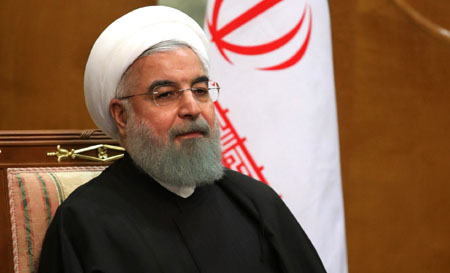by WorldTribune Staff, May 12, 2019
As his nation’s economy continues to collapse under the weight of U.S. sanctions, Iran’s president is calling for unity among the Islamic Republic’s political factions and its citizens.
“The pressures by enemies is a war unprecedented in the history of our Islamic revolution… but I do not despair and have great hope for the future and believe that we can move past these difficult conditions provided that we are united,” Iranian President Hassan Rouhani said on May 11.

Rouhani has been criticized by Iranian hardliners since President Donald Trump pulled the U.S. out of the Iran nuclear deal last year. Rouhani “has also been abandoned by some of his moderate allies,” noted Reuters.
Related: Gulf deployment ordered after intel revealed ‘credible’ Iran threat to U.S. forces in region
This week, Iran announced it would reduce some of its commitments under the 2015 nuclear deal, though it would not quit the deal completely. The U.S. responded by imposing new sanctions on Iran’s iron, steel, aluminum, and copper sectors.
On May 9, Trump urged Iran’s leaders to talk with him about giving up their nuclear program but also made it clear he could not rule out a military confrontation with the Islamic Republic.
Rouhani said current conditions in Iran could be rougher than those during the 1980s war with Iraq,
“Today, it cannot be said whether conditions are better or worse than the [1980-88 Iraqi] war period, but during the war we did not have a problem with our banks, oil sales, or imports and exports, and there were only sanctions on arms purchases,” he said, speaking to activists from various interest groups.
Radio Free Europe/Radio Liberty noted that “Amid high levels of inflation and skyrocketing living costs, workers in both the private and public sectors have taken to the streets and gone on strike to protest against poor working conditions as well as delays and nonpayment of wages.”
Meanwhile, the United States has been bolstering its military presence in the Persian Gulf and Middle East to counter what Washington sees as a growing threat from Iran.
The Pentagon on May 10 said the USS Arlington amphibious assault ship will join the USS Abraham Lincoln Carrier Strike Group and a B-52 bomber task force already headed toward the Persian Gulf after U.S. intelligence reports suggested Iran was planning an attack of some type in the region.
Trump’s national-security adviser, John Bolton, on May 5 said the aircraft carrier and its strike group were being deployed over unspecified “troubling and escalatory indications and warnings.”
Bolton and Secretary of State Mike Pompeo have warned Teheran that it would face “unrelenting force” if Iran attacked U.S. interests or its allies.
Your Intel Brief: Geostrategy-Direct __________ Fix The Media Now
